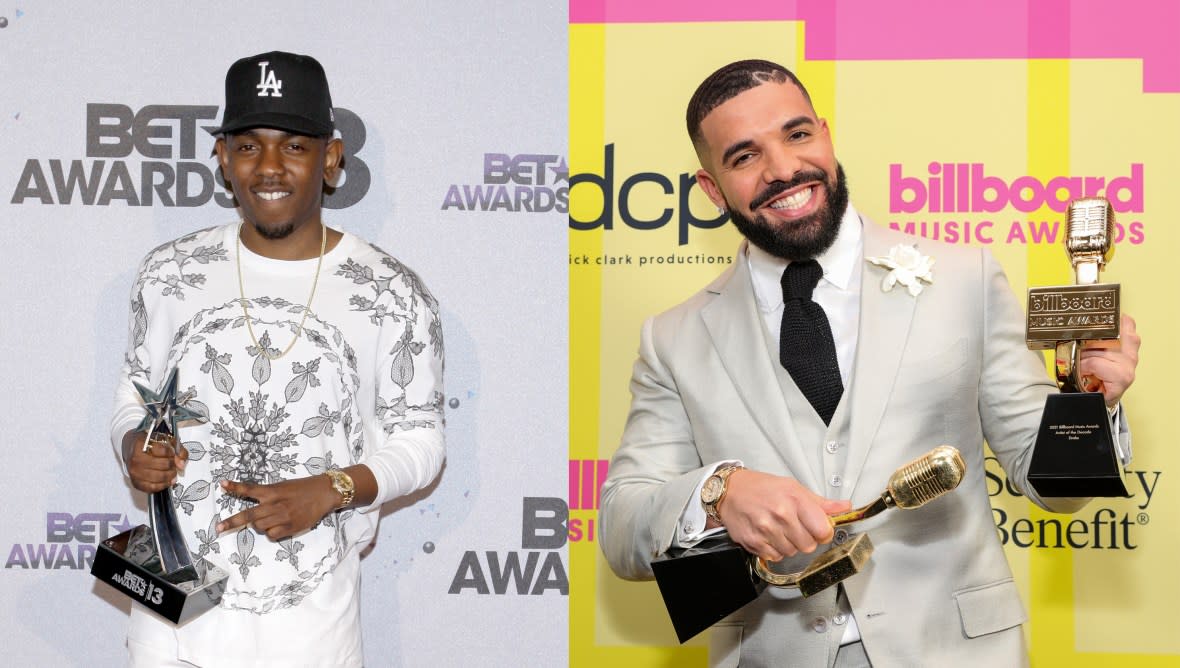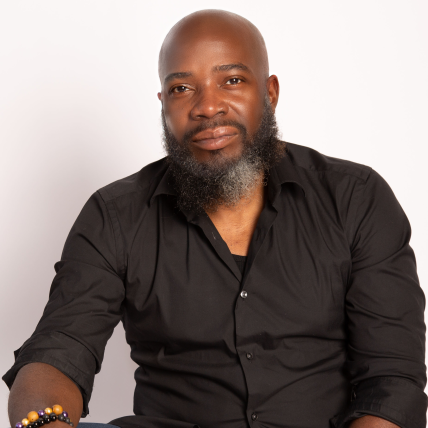Maybe we need more gatekeepers

- Oops!Something went wrong.Please try again later.
OPINION: The beef between Drake and Kendrick Lamar sparked an age-old debate about the difference between policing a culture and protecting it.
Editor’s note: The following article is an op-ed, and the views expressed are the author’s own. Read more opinions on theGrio.
Regardless of how you feel about hip-hop, rap battles or Brazilian butts, the musical poetry slam between Kendrick Lamar and Aubrey “Drake” Graham has sparked an interesting conversation about identity, history and — most of all — gatekeeping.
Defined as “one who controls access,” gatekeeping has always been controversial. To some, it represents the same notion of political, economic and social ownership used by the practitioners of white supremacy. Along with the record-breaking beef lullaby “Not Like Us,” many people interpreted Kendrick’s repeated references to Drake’s Canadian origins and Rick Ross’ jokes about Drake’s biracial identity as unwarranted and mean.
the “culture” is just starting to look like a bunch of hating nggas🤷🏽♀️
— ʲᵃʸ ⋆ 💫 (@30sStar) May 11, 2024
this some bullshit. we’re gatekeeping the kendrick / drake battle now?!?! 🙄 https://t.co/LVZ4CSxXzq
— For The Bay (@GoBearrs) May 5, 2024
To others, gatekeeping is necessary to protect one’s cultural heritage. They see Kendrick’s commentary about Drake being “not like us” as necessary and relevant.
Kendrick Lamar taught us a valuable lesson.
Sometimes Gatekeeping is a good thing 💀— BingalingDaDream (@ThisIsBing007) May 9, 2024
I appreciate Kendrick bringing back gatekeeping in hip hop this past week
— Lee (@AmGn_____) May 6, 2024
While both rappers will undoubtedly reap the financial rewards of the hit songs and international attention that the lyrical melee produced, K-Dot versus Kendrick’s lyrical roast battle was largely motivated by the competitive nature of hip-hop. Meanwhile, a global audience got to witness two artists at the top of their craft pour every ounce of talent, ability and imagination into the world’s most influential art form for one reason:
They did it for the culture.
Of all the historically accurate and socially conscious phrases popularized by Black Americans, perhaps “for the culture” is the most prescient. Along with “on my mama,” the phrase serves as a nod to the importance of the ancestors and how our past influences our present. It also signals an implicit understanding of America and the world. “The culture” doesn’t just refer to hip-hop; Black creativity is a fundamental ingredient in every single morsel of music, dance, food and language that the world consumes and characterizes as “American” art and culture. Therefore, when one does something “for the culture,” they are, by definition, doing it for Black people.
We are the culture.
Recommended Stories
7 reasons why Kendrick versus Drake is the greatest battle in hip-hop history
The beauty of hate: A literary analysis of Kendrick Lamar’s ‘Euphoria’
But unlike history, truth and Black people’s existence, culture is not invincible. If the “customary beliefs, social forms, and material traits of a racial, religious or social group” are not intentionally preserved or protected, it is prone to erasure, theft, misappropriation and outright sabotage. And historically, the path to cultural destruction for societies around the globe begins with one phrase:
“And then, white people showed up.”
To be clear, whiteness is not inherently evil. The biological myth of race is a byproduct of capitalism and colonization but that doesn’t mean that it is not real. Human bondage existed in African cultures long before Portuguese explorers Nuno Tristão and Antão Gonçalves landed on the western coast of Africa in 1441 and kidnapped 12 Africans. But that form of enslavement was neither race-based nor perpetually inescapable. The human beings were not considered chattel … until white people showed up. The Chinese used gunpowder for fireworks and hand-to-hand combat for centuries. Then white people showed up and opened trade between Asia and Europe, jump-starting the global arms race. While nearly every society historically fought for territory and resources, the individual ownership of land was a foreign concept to the indigenous people of North America. Then white people showed up. As a social construct, whiteness is as real as slavery or guns or real estate. While some conflate hip-hop culture with the global phenomenon that is rap music, they are two separate and distinct things. Hip-hop is a Black American cultural movement that is part of the Black American cultural experience. Rap music, on the other hand, is just a byproduct of that artistic expression. Anyone can make, listen to and appreciate rap music, even if they are not part of the culture.
Kendrick’s and Ross’ critiques of Drake were largely about the “shared attitudes, values, goals, and practices that characterize” Black Americans. To them, Drizzy was an inauthentic interloper. There is nothing inherently wrong with a rapper taking Ozempic or pretending to be a gangster. There is nothing inherently wrong with whiteness. The viral “BBL Drizzy” songs were only disparaging in the context of the culture (Even Sir Mix-a-lot couldn’t deny his preference for big butts). Ross and Kendrick were doing it for the culture.
And then DJ Vlad showed up.
There is no need for me to rehash the exploits of the king of culture vultures, hip-hop journalist Vladimir Lyubovny (You can read it here). But when Vlad poked his head into Black people’s business and threatened to snitch on Princeton Professor Morgan Jerkins, many people took issue with Jerkins’s attempt at “gatekeeping” for telling Vlad to stay out of Black folks’ business.
Looool! Kendrick Lamar fans now gatekeeping who’s from the culture and who’s not and their criteria is you need to be Kendrosexual!💀💀💀
— Trentinho-66 (@DLent91) May 10, 2024
Ima fan of @kendricklamar but for yall to completely discredit the fact that he made tracks based off of lies and yall eating it up just shows me that this exhibition already had a winner lol. & stop gatekeeping culture. Black ppl was just on here celebrating cinco de mayo 😂😂😂
— Slim Baby (@illfgndoitagain) May 7, 2024
Because Drake and Kendrick opted to share their beef with a global audience, everyone gets to have an opinion. However, people who have a shared cultural background and history are not required to accept every opinion as equally valid. They have a right to tell Vlad to stay out of Black folks’ business. But DJ Vlad is just one of many hip-hop capitalists. His opinion wouldn’t even matter if someone were keeping the gate.
After considerable reflection, I would like to apologize to @MorganJerkins for tagging her job in my replies during our Twitter exchange last weekend.
— DJ Vlad (@djvlad) May 8, 2024
Before hip-hop culture was commodified and commercialized, hip-hop reflected the totality of the Black experience. Conscious rappers like Public Enemy and KRS-One were as revered inside the culture as NWA and Uncle Luke. It was introspective and playful and meaningful and joyous — just like Black people. But we left the gate open. And then white people showed up.
If there was better gatekeeping, maybe hip-hop connoisseurs wouldn’t expect that every rap beef wouldn’t turn into violence. If not for capitalism, there might be a Rapsody for every Megan Thee Stallion, and female rappers wouldn’t have to tolerate discussions about respectability politics and sexualization. If there were more gatekeeping, DJ Vlad would be another YouTuber hating from outside the club. Had we not left the gate open, Drake would be a pop star and Kendrick wouldn’t have to comment on Drizzy’s need for cultural approval.
But white people keep showing up at the party like …
Here’s one more story.
Because the Andean culture was rooted in the principle of mutual respect and good trade known as ayni, the most highly valued Inca crop was specifically reserved for medicinal and religious use. Their cultural tradition prevented abuse and commodification. But when Spanish conquistadors arrived in 1532, they mocked the indigenous people and ignored their cultural traditions. Instead, they turned the Incas’ cultural artifact into a commodity. “It is the most profitable product in the Indies,” wrote one Catholic missionary. Of all the gold, human labor and resources plundered from Incan society, the commodification of this one stolen cultural treasure still reverberates around the world. They called it a “gift of the gods.” We call it “cocaine.”
The problem is not hip-hop. Gatekeeping has never been a problem. The problem is capitalism. But, like cocaine, guns, drugs and hip-hop beef…
Whiteness is just a gateway drug.

Michael Harriot is a writer, cultural critic and championship-level Spades player. His NY Times bestseller Black AF History: The Unwhitewashed Story of America is available in bookstores everywhere.
More must-reads:

